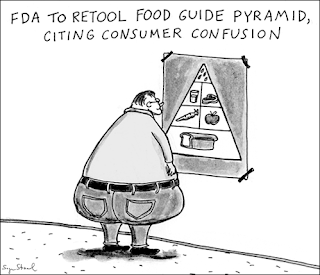 |
| The most amusing and telling RD response to why Dietary Guidelines don't work is that people don't follow them. |
If you are one of the rare people who can subsist on donuts, Marlboros and Mountain Dew and still live to 100, please ignore what follows. Most people, however, need to make conscious food choices to look and feel good, choices which can be hard to make when the government-healthcare-media complex continues to push yesterday's discredited dietary advice as if it were handed down by God on stone tablets.
The historic rationale behind our dietary misguidelines is very complex, but you can find a most entertaining detailed recap here. The Readers Digest version is we have rabbits, lazy researchers and failed presidential candidate George McGovern to blame.
I happened upon low-carb high-fat eating by accident, basically after following the Medifast Take Shape for Life program and dropping 35 pounds with minimal effort. I no longer eat any Medifast foods; nor do I endorse its low-fat manufactured food approach; but what that diet did teach me was I did not need to eat pasta, potatoes and bread to feel satisfied.
In fact, by eliminating what I like to call "the whites," I could eat more of the foods I liked better, like avocados, steak, bacon, nuts, seeds, butter, and whole-fat cheese (along with vegetables and low-sugar fruits like blueberries) -- and not feel hungry between meals.
Satiety is the key to being compliant on any diet since if you don't feel satisfied you will be jonesing to eat foods that are not on plan. That is why people cheat on their diets and then binge on more forbidden foods because they feel guilty or bad about themselves.
Since following a low-carb high-fat way of eating, I don't ride that merry-go-round any more.
What's funny is that even with all the publicity in recent years suggesting studies on saturated fat were bogus and carbohydrates are the real culprits behind our nation's chronic diseases, such as Type 2 Diabetes (no longer called Adult Onset Diabetes because children are now being diagnosed with it), many people have not yet gotten the memo. This, despite the documented success doctors like Sarah Hallberg, Andreas Eenfeldt, Rangan Chatterjee, Tim Noakes and others have had with patients following high-fat low-carb diets.
Not to mention myth shattering books like Gary Taubes' Good Calories, Bad Calories and Nina Teicholz's The Big Fat Surprise.
Sometime this month, the federal government is going to issue another set of U.S.D.A. Dietary Guidelines that will likely continue to make Americans fatter and sicker. Fortunately, there are many books and articles now available that refute the faulty research on which the guidelines are based and demonstrate how and why low-carb high-fat diets are healthier for most people.
So before drinking that Diet Coke and driving to the gym to work off the egg white omelet you had for breakfast, resolve on this first day of 2016 to do your own research to determine which diet is healthiest for you.
You may never have to subject yourself to a sad low-fat dinner of poached chicken breast, quinoa and steamed broccoli again.
Great post! I would add simply because you would be weaning yourself off an addiction, save money, shorten your shopping list and trips to the store, work less in the kitchen, stock less things in your pantry/fridge and feel satisfied.
ReplyDeleteThanks, Rina. All of the benefits you mentioned hold true for me, too!
DeleteI would love to hear more about your transition from Medifast to LCHF eating. I have done both, currently on Medifast but plan on going back to LCHF for maintenance and maybe before that as I'm getting tired of the MEdifast way of live and believe all of the research and teachings of nutritional ketosis. I am over 1/3 way to my goal weight. What differences have you seen in weight loss, ect between the two programs? Thanks!
DeleteI use #LCHF to maintain my weight loss so can't compare with Medifast as far as weight loss goes. If I were to do it again, though, I'd try losing weight with a very low carb approach and gradually add back more carbs in the form of veggies, blueberries, etc. as I neared my optimal weight. Would definitely never eat low fat again, even if I were to do Medifast (which is not likely). Real food with satiating fat works best for me. Also, not eating all the time so my body has a chance to burn fat for energy. Hope that helps!
DeleteAre you paying over $5 per pack of cigs? I'm buying my cigarettes at Duty Free Depot and this saves me over 60% from cigs.
ReplyDelete